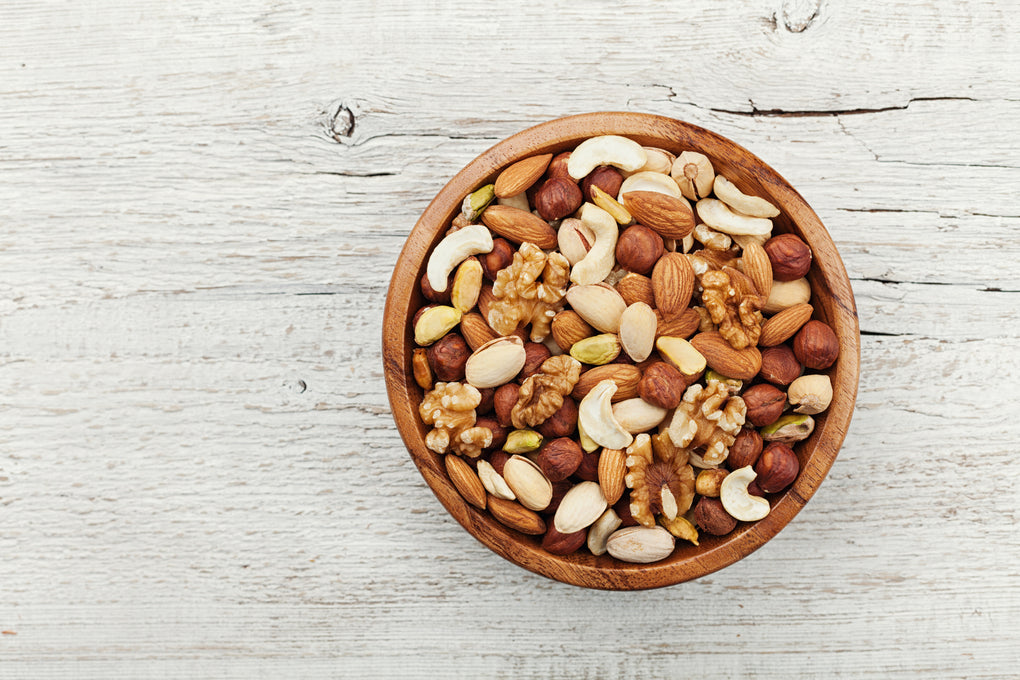The Nutrition of Nuts
28th May 2019 / Health
The Nutrition of Nuts
Zoe Milkowski

Is it just us or has the world gone a bit nuts recently? There seems to be a new nut-related product gracing our shelves almost every week, and let’s not even get started on nut butters… Nuts have been labelled as a healthy snacking option and while they do indeed offer a whole host of fantastic health benefits, they are also quite high in fat, so portion size is key when adding some nutty snacks into your diet.
On the whole, all types of nuts are a great source of protein, fibre and healthy, essential fats - namely monounsaturated fat, omega-3 and omega-6 polyunsaturated fats, with some of the fat content being the less healthy, saturated type. With over 20 different types of edible nuts available to us (try naming them all!), we’ve picked our top 6 and detailed a few of their amazing nutritional profiles and health benefits below.
Almonds
1 serving of almonds (28g or a small handful) contains:
- 14g of fat
- 6g protein
- 3.5g fibre
Almonds are also rich in calcium, so are perfect for those of us who can’t tolerate dairy or try to avoid it. Calcium is an essential mineral that is crucial for survival as well as the commonly known benefit it has on the maintenance of strong and healthy bones.
Almonds are also rich in vitamin E, providing over 35% of the reference daily intake for an adult in 1 serving. Vitamin E vitamins (because the term actually refers to a group of 8 fat-soluble compounds) are responsible for supporting healthy skin and eyes as well as a strong immune system. The effects of adding more vitamin E into your diet can specifically be seen in the appearance and condition of your skin. Vitamin E is a powerful antioxidant that works to protect the skin from UV damage as well as oxidative stress caused by free radicals.
*Nutrition Tip* use the whole almond (instead of flaked) in your recipes as the skin contains valuable antioxidant flavonoids which help to reduce free radical damage as well as potentially reducing your risk of coronary heart disease.
Stuck for ideas on how to include almonds in your recipes? Why don’t you have a look at our Vegan Protein Smoothie Bowl recipe in our Energy eBook, which you can download here.
Pistachios
1 serving contains:
- 12.5g fat
- 6g protein
- 3g fibre
Pistachios are the only known nuts to contain decent amounts of lutein and zeaxanthin - 2 antioxidants that are specifically beneficial for your eye health. These two nutrients are examples of carotenoids naturally found in many plants and vegetables, as well as the macula - a part of the human eye. Studies have shown these two carotenoids to positively reduce your risk of macular degeneration (a deterioration of the eye that can result in blurred and/or loss of vision) and cataracts (clouding of the eye’s lens).
Walnuts
1 serving provides:
- 18g of fat
- 4g protein
- 2g fibre
Walnuts have a slightly higher fat content than other nuts, but most of this is the heart-healthy type of fat; mono-unsaturated and omega-3 fatty acids (specifically alpha-linolenic acid (ALA)), which makes walnuts a great alternative to oily fish if you’re not a fan. As a consequence of this omega-3 fatty acid content, walnuts have been shown to greatly benefit heart health and reduce various heart disease risk factors. Studies have also shown that eating walnuts lowers your levels of “bad” cholesterol (LDL) and further reduces your risk for heart disease and stroke.
Cashews
1 small handful of cashews contains:
- 12g fat
- 5g protein
- 1g fibre
Cashews are one of the three types of nuts listed as being very high in saturated fat and therefore should be consumed sparingly in a healthy and balanced diet. They do, however, present as a great source of protein and can also be a great way of getting key minerals such as iron and zinc into a vegetarian or vegan diet. Cashews are also a great source of the essential mineral magnesium, with 1 serving providing over 20% of your RDI. Magnesium is involved in over 300 different enzyme-related reactions in the body and plays a key role in muscle and nerve function, maintaining the health of your immune system and the body’s energy-producing metabolism process. Adding a handful of cashews to your next stir fry is a fantastic (and delicious) way to pack some more nutrients into your dinner.
If you want a more convenient and surefire way to ensure your body is getting enough magnesium, you could try our Food Based Magnesium supplement which provides 100mg of Food Based, highly-absorbable elemental magnesium in each capsule. Our Magnesium boost is gentle on the stomach and designed to support quality rest and a busy lifestyle.
Pecans
Provide in 1 serving:
- 20g of fat
- 3g of protein
- 4g of fibre
Pecans are classified as having a medium saturated fat content and can therefore be regularly enjoyed as a snack or in your recipes. Pecans are known for being one of the nuts highest in polyphenols, natural antioxidant compounds found abundantly in fruits, vegetables and olive oils. These natural antioxidants help protect the body against oxidative damage caused by free radicals and also helps to lower your risk of cardiovascular complications, such as narrowing arteries and arterial plaque build up. In addition to this, pecans are also high in plant sterols - highly important natural plant compounds that help to reduce the level of bad cholesterol in the body (LDL).
And if these benefits weren’t enough, pecans are also rich in vitamin B3 - the vitamin responsible for helping our body convert the nutrients in our food into usable energy. B vitamins are known for their vitalising abilities and key role in the body’s energy-yielding metabolism process. Our Food Based B complex goes above and beyond simply supplying one or two B vitamins and actually provides all 8 essential B vitamins to help anyone face life’s demands. If you feel the need to fight fatigue, then our B complex is definitely for you.
Peanuts
1 serving provides:
- 17g fat
- 4g protein
- 3g fibre
Possibly the most well known of all the nuts here due to the sudden boom of the peanut butter market (we’re not complaining), peanuts are not actually strictly “nuts” but are a member of the legume family. Peanuts have been shown to reduce heart disease risk factors, decrease the chance of contracting type 2 diabetes and even lower death rates (found in a research study conducted on over 120,000 people). These benefits could be due to the combined effects of a number of nutrients that peanuts are high in. These vitamins and minerals include copper, vitamins B1 (thiamine), B3 (niacin) and B9 (folate) as well as magnesium and the powerful antioxidant vitamin E.
If you want to add some peanut power into your diet make sure that the snack products you choose are healthy and beneficial as many nut products can be highly processed and filled with additives, which can reduce their health benefits. Peanut butter, for example, can be a healthy snack option if the correct brand is chosen. Try to opt for the highest peanut-containing brand with as little additives (oil, sugar, salt) as possible. The general rule of thumb is that the more processed and additive-filled the end product, the fewer health benefits it will contain.
From The Blog
-

25th February 2025 / Health
Empowering Women’s Health: Key Supplements for Well-being
Women’s health is a lifelong journey, with each stage presenting unique nutritional and wellness needs. From maintaining energy levels to supporting hormonal balance and bone health, the right comb...
Read article -

17th February 2025 / Health
Empowering Women’s Health: Lifestyle Tips and a Key Supplement for Perimenopause and Menopause
NaomiWomen’s health evolves through various life stages, and the transition into perimenopause and menopause brings unique challenges. During these phases, hormonal fluctuations can lead to symptom...
Read article -

10th February 2025 / Health / Products
The Best Foods and Drinks to Help Your Body Recover from Burnout
Burnout is a growing issue in today’s fast-paced work culture, leaving many people feeling exhausted, overwhelmed, and depleted. While rest and self-care are essential, nutrition plays a crucial ro...
Read article




